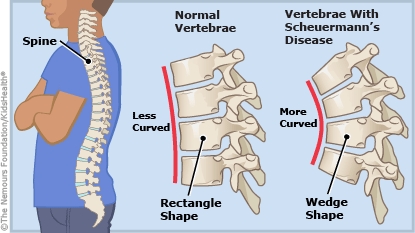Scheuermann's Disease: How to Care for Your Child
Most kids with Scheuermann's disease can live normal, active lives and do not have back pain once they reach their adult height.


Scheuermann's disease is a common cause of back pain in growing children. It happens when bones in the spine (the vertebrae) are "wedged" or squeezed together during a growth spurt. As a result, the spine looks like it is hunched (or bent) forward.
Scheuermann's disease usually happens in kids between the ages of 10 and 12. It is more common in boys than girls. The exact cause is not known, but it can run in families.
Kids with Scheuermann's disease may have back pain, which often is worse after activity and improves after rest. This curved spine may continue to get worse as the child grows. Once the child stops growing, the pain usually improves; however, some kids have symptoms into adulthood.
The health care provider talked to you and your child and did a physical exam. X-rays helped the health care provider measure the curve in your child's spine.
Treatment for Scheuermann's disease depends on whether your child is in pain, how much the spine is curved, and the stage of your child's growth. Some children may only need pain relief and stretching/strengthening exercises. Other kids may need to wear a brace. Sometimes, surgery is recommended.

-
If your child has back pain, decreasing activity may help. Your child should especially cut down on activities that involve bending or straightening the back.
-
Be sure to schedule and keep any physical therapy appointments the health care provider prescribed.
-
If your child has pain, a medication can help:
-
If the health care provider suggested a brace, make sure your child wears it as instructed.
-
Have your child avoid carrying heavy things if this causes back pain.


Your child: